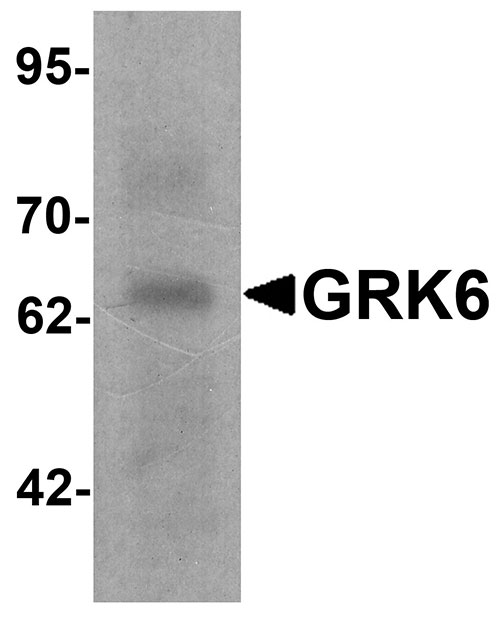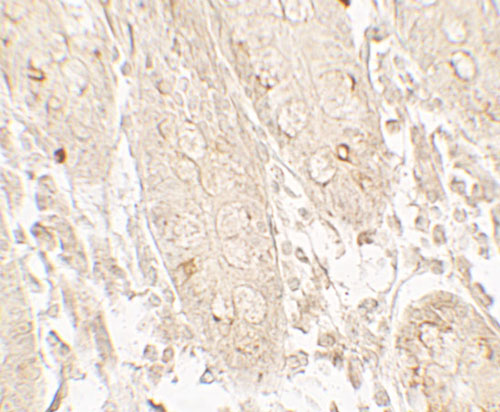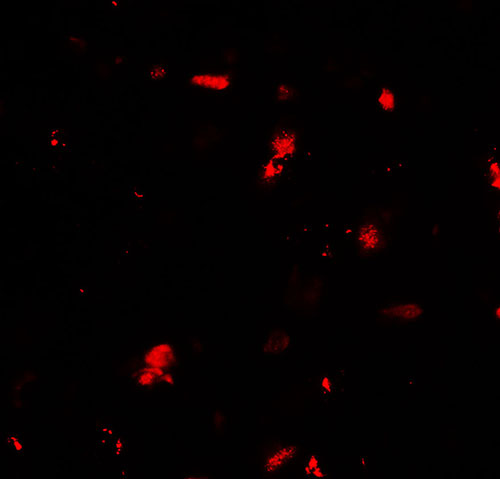GRK6 Antibody
- SPECIFICATION
- CITATIONS
- PROTOCOLS
- BACKGROUND

Application
| WB, IHC-P, IF, E |
|---|---|
| Primary Accession | P43250 |
| Other Accession | NP_001004106, 51896039 |
| Reactivity | Human, Mouse, Rat |
| Host | Rabbit |
| Clonality | Polyclonal |
| Isotype | IgG |
| Calculated MW | Predicted: 63 kDa Observed: 63 kDa |
| Application Notes | GRK6 antibody can be used for detection of GRK6 by Western blot at 1 - 2 µg/ml. Antibody can also be used for Immunohistochemistry starting at 5 µg/mL. For immunofluorescence start at 20 µg/mL. |
| Gene ID | 2870 |
|---|---|
| Target/Specificity | GRK6; GRK6 antibody is human, mouse and rat reactive. Multiple isoforms of GRK6 are known to exist. This antibody is predicted to not cross-react with other members of the GRK protein family. |
| Reconstitution & Storage | GRK6 antibody can be stored at 4℃ for three months and -20℃, stable for up to one year. |
| Precautions | GRK6 Antibody is for research use only and not for use in diagnostic or therapeutic procedures. |
| Name | GRK6 |
|---|---|
| Synonyms | GPRK6 |
| Function | Specifically phosphorylates the activated forms of G protein- coupled receptors. Such receptor phosphorylation initiates beta- arrestin-mediated receptor desensitization, internalization, and signaling events leading to their desensitization. Seems to be involved in the desensitization of D2-like dopamine receptors in striatum and chemokine receptor CXCR4 which is critical for CXCL12-induced cell chemotaxis (By similarity). Phosphorylates rhodopsin (RHO) (in vitro) and a non G-protein-coupled receptor: LRP6 during Wnt signaling (in vitro). |
| Cellular Location | Membrane; Lipid-anchor. |
| Tissue Location | Widely expressed.. |

Thousands of laboratories across the world have published research that depended on the performance of antibodies from Abcepta to advance their research. Check out links to articles that cite our products in major peer-reviewed journals, organized by research category.
info@abcepta.com, and receive a free "I Love Antibodies" mug.
Provided below are standard protocols that you may find useful for product applications.
Background
The G protein–coupled receptor kinases (GRKs) are a versatile family of kinases that play a critical role in cancer metastasis through their regulation of G-protein coupled receptors (GPCRs) involved in growth factor mediated cell migration (1,2). Phosphorylation of receptors by GRKs appears to be strictly dependent on the receptor being in its agonist-activated state (1). GRK6 is one of 7 members of the GRK serine/threonine kinase subfamily, which has been shown to modulate the Wnt signaling pathway via phosphorylation of LRP6 (3,4), and the insulin-like growth factor signaling pathway (4). GRK6 may also play a role in immune system function (5).
References
Inglese J, Freedman NJ, Koch WJ, et al. Structure and mechanism of the G protein-coupled receptor kinases. J. Biol. Chem. 1993; 268:23735-8.
Raghuwanshi SK, Smith N, Rivers EJ, et al. G protein-coupled receptor kinase 6 deficiency promotes angiogenesis, tumor progression, and metastasis. J. Immunol. 2013; 190:5329-36.
Benovic JL and Gomez J. Molecular cloning and expression of GRK6. A new member of the G protein-coupled receptor kinase family. J. Biol. Chem. 1993; 268:19521-7.
Chen M, Philipp M, Wang J, et al. G Protein-coupled receptor kinases phosphorylate LRP6 in the Wnt pathway. J. Biol. Chem. 2009; 284:35040-8.
If you have used an Abcepta product and would like to share how it has performed, please click on the "Submit Review" button and provide the requested information. Our staff will examine and post your review and contact you if needed.
If you have any additional inquiries please email technical services at tech@abcepta.com.













 Foundational characteristics of cancer include proliferation, angiogenesis, migration, evasion of apoptosis, and cellular immortality. Find key markers for these cellular processes and antibodies to detect them.
Foundational characteristics of cancer include proliferation, angiogenesis, migration, evasion of apoptosis, and cellular immortality. Find key markers for these cellular processes and antibodies to detect them. The SUMOplot™ Analysis Program predicts and scores sumoylation sites in your protein. SUMOylation is a post-translational modification involved in various cellular processes, such as nuclear-cytosolic transport, transcriptional regulation, apoptosis, protein stability, response to stress, and progression through the cell cycle.
The SUMOplot™ Analysis Program predicts and scores sumoylation sites in your protein. SUMOylation is a post-translational modification involved in various cellular processes, such as nuclear-cytosolic transport, transcriptional regulation, apoptosis, protein stability, response to stress, and progression through the cell cycle. The Autophagy Receptor Motif Plotter predicts and scores autophagy receptor binding sites in your protein. Identifying proteins connected to this pathway is critical to understanding the role of autophagy in physiological as well as pathological processes such as development, differentiation, neurodegenerative diseases, stress, infection, and cancer.
The Autophagy Receptor Motif Plotter predicts and scores autophagy receptor binding sites in your protein. Identifying proteins connected to this pathway is critical to understanding the role of autophagy in physiological as well as pathological processes such as development, differentiation, neurodegenerative diseases, stress, infection, and cancer.




